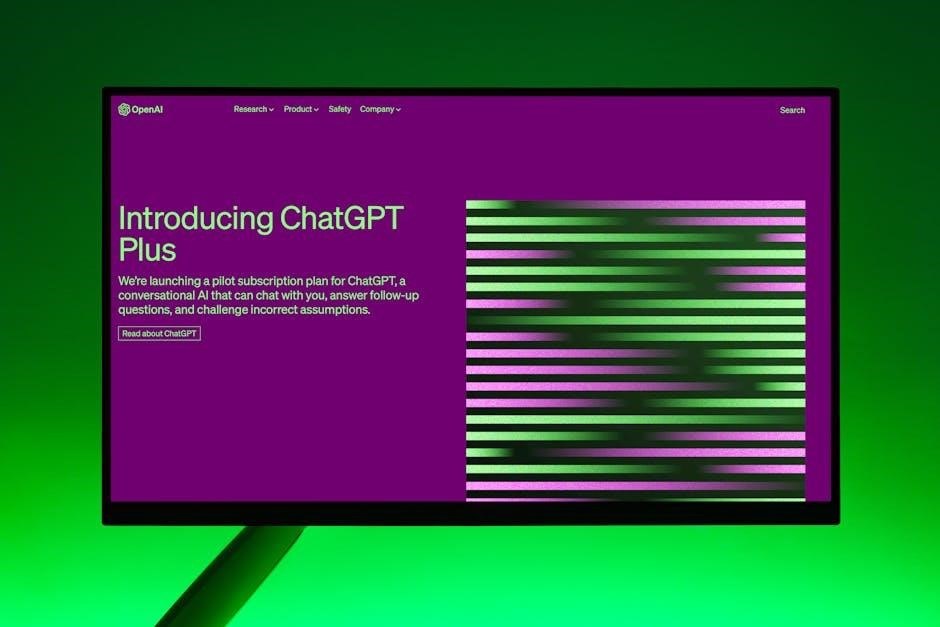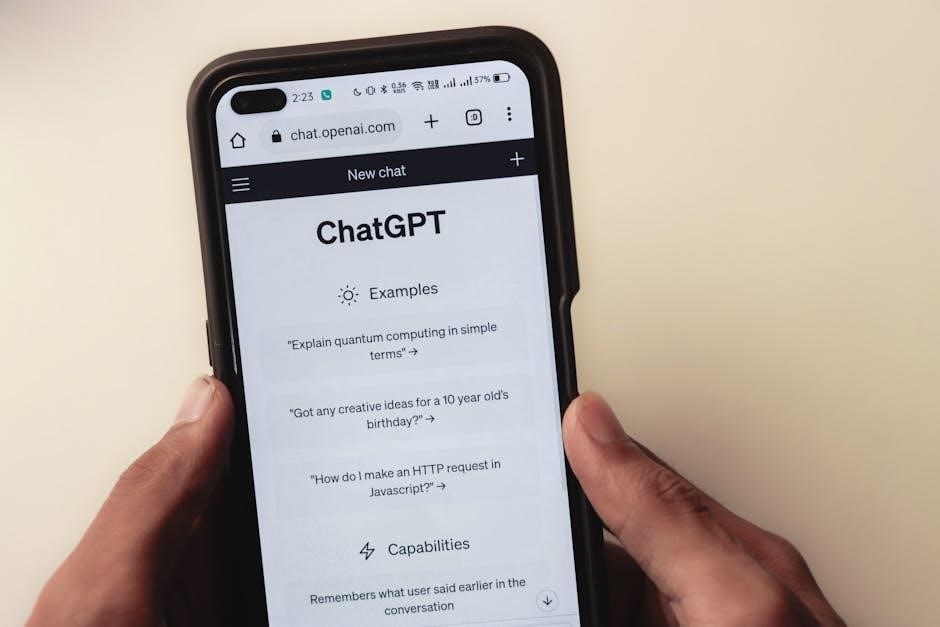
filetype:pdf chatgpt
Understanding ChatGPT and PDF Interaction
ChatGPT, powered by models like GPT-4o, excels as an AI chatbot with diverse functions․ It can generate content, engage in conversations, and provide information on various topics, rivaling other leading AI systems․
Overview of ChatGPT Capabilities
ChatGPT, a creation of OpenAI, is a widely recognized AI chatbot known for its comprehensive features․ It has become popular due to its ability to converse with users, generate content, and perform various tasks․ ChatGPT is based on advanced models such as GPT-4o, enabling users to interact with AI in a conversational manner․ Its capabilities are diverse, ranging from answering questions and providing explanations to drafting emails and creating summaries․ ChatGPT offers a full suite of features that rival other AI systems like Google Gemini․ The AI can be used as a search engine by specifying websites for results․ The chatbot functionality extends to generating content, offering creative writing, and even aiding in research․ This makes it a versatile tool for a wide range of applications, from personal use to professional tasks․ Its ability to learn and adapt to different conversation styles and topics sets it apart, making it a leading AI chatbot in today’s market․ OpenAI continues to update and refine ChatGPT, further enhancing its capabilities and solidifying its position as a top AI tool․
Limitations of Direct PDF Interaction
While ChatGPT excels in many areas, direct interaction with PDF files poses certain limitations․ ChatGPT, in its standard form, cannot directly access and process the content of PDF documents․ To work with PDFs, users typically need to employ workarounds or external tools․ One common method involves converting the PDF content into a text format that ChatGPT can understand․ This conversion process, however, can sometimes lead to formatting issues and loss of data integrity․ Another limitation is the inability of ChatGPT to directly interpret the visual elements within a PDF, such as images, charts, and tables․ This restricts its ability to provide comprehensive analysis or summaries that require understanding these visual components․ Furthermore, dealing with large PDF files can be challenging due to the token limits of ChatGPT․ Users may need to break down the PDF into smaller sections to process the information effectively․ Security concerns also arise when uploading sensitive PDF documents to third-party platforms for processing․ Despite these limitations, there are alternative methods and plugins available to enhance ChatGPT’s ability to interact with PDF files, which we will explore later․ These methods aim to bridge the gap and enable more seamless integration between ChatGPT and PDF content․

Methods for Using ChatGPT with PDF Files
The AskYourPDF plugin simplifies PDF interaction with ChatGPT․ Users upload PDFs, then AskYourPDF enables ChatGPT to analyze the document by providing a link․ This streamlines extracting information and answering questions․
AskYourPDF Plugin
AskYourPDF is a smart extension designed to make working with PDF files easier within ChatGPT․ The core functionality involves allowing ChatGPT to analyze and understand the content within a PDF document․ To use it, you need to select an online PDF document, copy the link to it, and paste that link into ChatGPT along with your query․ This process allows ChatGPT to “read” and interpret the PDF content․ The file needs to be publicly accessible, such as through a Google Drive link, to enable ChatGPT to access and process it via the plugin․ Once the link is provided, you can ask ChatGPT specific questions related to the PDF’s content, and it will provide answers based on its analysis․ This is particularly useful for extracting key information, summarizing lengthy documents, or finding specific details within a large PDF file․ The AskYourPDF plugin effectively bridges the gap between ChatGPT’s language processing capabilities and the structured data often found in PDF documents, making it a valuable tool for research, analysis, and content generation․ The plugin enhances productivity by automating the process of reading and understanding PDFs, saving users time and effort․ This integration allows for quick insights and efficient interaction with PDF-based information․ The plugin enables ChatGPT to study PDF files by loading the file to public access by sending a link with a question to neural networks․ This enables better analysis․
Using External Links to PDFs

Leveraging external links to PDFs is a crucial method for enabling ChatGPT to interact with and extract information from PDF documents; Since ChatGPT does not directly process local files, providing an accessible link to a PDF hosted online becomes essential․ This approach involves uploading the PDF to a publicly accessible platform, such as Google Drive or a similar cloud storage service, and then sharing the generated link with ChatGPT․ Once ChatGPT receives the link, it can access the PDF content and analyze it based on user prompts․ This method is particularly effective when used in conjunction with plugins like AskYourPDF, which are designed to facilitate this interaction․ By providing the external link, users can ask specific questions related to the PDF’s content, request summaries, or extract key data points․ The accuracy and effectiveness of this method depend on the quality of the link and the ability of ChatGPT to interpret the document’s structure and text․ It’s important to ensure that the PDF is properly formatted and that the link remains active and accessible throughout the interaction․ This approach allows users to leverage ChatGPT’s language processing capabilities to gain insights from PDF documents efficiently and effectively․ Moreover, the use of external links promotes collaboration and information sharing, as multiple users can access the same PDF through ChatGPT․ The accessibility of PDFs through online links is what makes this method effective․

Applications of ChatGPT and PDF Integration
ChatGPT’s ability to interact with PDFs opens doors for efficient research and analysis․ Users can extract information, summarize content, and answer specific questions from PDF documents quickly․
Research and Analysis of PDF Content
The integration of ChatGPT with PDF files significantly enhances research and analytical capabilities․ By leveraging plugins like AskYourPDF, users can efficiently extract key insights from extensive documents․ This streamlines the process of literature reviews, data analysis, and information gathering․ The ability to upload a PDF, or provide a link to one, such as from Google Drive, allows ChatGPT to study the content․ Users can then ask specific questions, request summaries, or even have the AI identify key themes and arguments․ This functionality is particularly useful for professionals and academics who need to quickly process large volumes of information․ Furthermore, ChatGPT’s natural language processing skills enable it to understand the context of the PDF content, leading to more accurate and relevant results․ The Deep Research tool can be used for in-depth research․ The AI can analyze research papers, reports, and other PDF documents to provide users with a comprehensive understanding of the subject matter․ This can save considerable time and effort compared to manually reading and analyzing each document․ By utilizing these tools, researchers can focus on higher-level tasks, such as interpreting findings and drawing conclusions, rather than spending countless hours on initial data extraction and summarization․ It’s a powerful combination for boosting productivity and gaining deeper insights from PDF resources․
Content Generation from PDF Sources
ChatGPT’s ability to interact with PDF files opens up exciting possibilities for content generation․ By using PDF documents as source material, users can leverage ChatGPT to create new content, such as articles, summaries, or even marketing materials․ For example, a user could upload a PDF report and ask ChatGPT to generate a blog post summarizing the key findings․ Or, a user could provide a link to a PDF containing research data and request ChatGPT to create a compelling infographic description․ This process is facilitated by tools like AskYourPDF, which allow ChatGPT to access and understand the information within the PDF․ Furthermore, ChatGPT can be instructed to adopt a specific tone or style, ensuring that the generated content aligns with the user’s brand or target audience․ The AI can also be used to translate content from PDF files into different languages, making it a valuable tool for global businesses․ However, it is important to ensure that the generated content is original and does not infringe on any copyright laws․ Content creators can use PDF data to create new ideas․ By carefully reviewing and editing the output, users can ensure that the final product is accurate, informative, and engaging․ It’s a powerful way to repurpose existing information and create fresh, relevant content․

Ethical Considerations and Best Practices
Using ChatGPT with PDF content demands careful attention to copyright and intellectual property․ Ensure proper authorization before using copyrighted material to avoid infringement issues and legal repercussions․
Copyright and Intellectual Property
When leveraging ChatGPT to process and utilize information extracted from PDF documents, a crucial ethical consideration revolves around copyright and intellectual property rights․ PDFs often contain proprietary information, creative works, and research findings that are protected by copyright laws․ Therefore, it is imperative to ascertain the ownership and usage rights associated with the PDF content before employing ChatGPT for analysis, summarization, or content generation․ Unauthorized reproduction, distribution, or adaptation of copyrighted material obtained from PDFs can lead to legal ramifications, including copyright infringement lawsuits․ To mitigate such risks, users should diligently verify the licensing terms and conditions governing the use of the PDF content․ If the PDF is subject to copyright restrictions, obtaining explicit permission from the copyright holder is essential before utilizing the content in conjunction with ChatGPT․ Furthermore, it is advisable to implement measures to prevent the inadvertent disclosure or misuse of confidential information contained within PDFs․ This may involve redacting sensitive data, anonymizing personal information, and adhering to strict data privacy protocols․ By prioritizing copyright compliance and intellectual property protection, users can ensure that their utilization of ChatGPT with PDF files is both ethical and legally sound․ Remember to always give credit where it is due and respect the original creators’ rights․
Data Privacy and Security
Safeguarding data privacy and security is paramount when integrating ChatGPT with PDF files, particularly when dealing with sensitive or confidential information․ PDFs may contain personal data, financial records, medical histories, or other types of protected information that require stringent security measures to prevent unauthorized access, disclosure, or misuse․ When utilizing ChatGPT to process PDF content, it is imperative to implement robust data encryption techniques to protect the confidentiality of the information during transit and storage․ Secure communication channels should be employed to transmit PDFs to ChatGPT, and access controls should be implemented to restrict unauthorized individuals from accessing the processed data․ Furthermore, users should be mindful of the data retention policies of ChatGPT and ensure that sensitive information is not stored for longer than necessary․ Regular security audits and vulnerability assessments should be conducted to identify and address potential security weaknesses in the ChatGPT integration․ Additionally, it is essential to comply with all applicable data privacy regulations, such as GDPR or HIPAA, when processing personal data contained within PDFs․ This may involve obtaining informed consent from data subjects, implementing data anonymization techniques, and providing individuals with the right to access, rectify, or erase their personal information․ By prioritizing data privacy and security, users can ensure that their utilization of ChatGPT with PDF files is responsible, ethical, and compliant with all applicable legal requirements․ Proper handling of data is crucial․